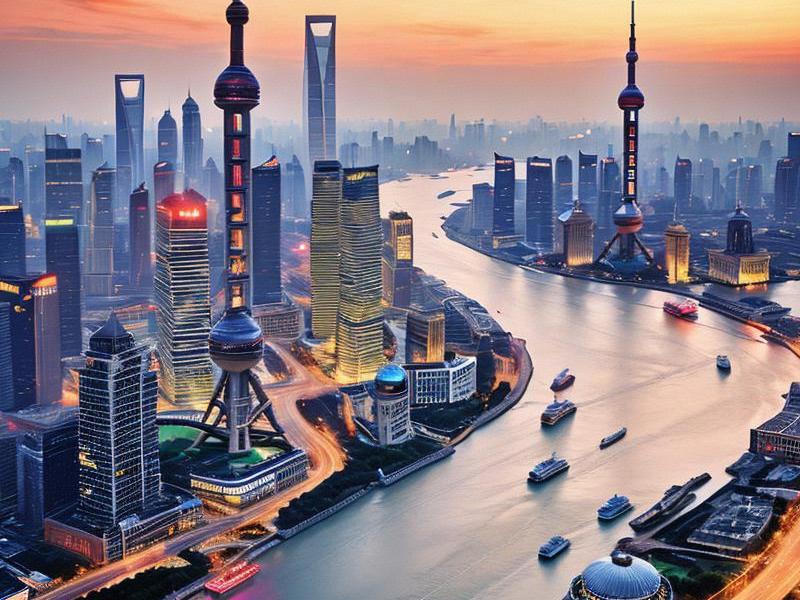Shanghai, a vibrant metropolis on the banks of the Huangpu River, stands as a symbol of China's rapid modernization and its integration into the global economy. This article delves into the multifaceted aspects of Shanghai, exploring its historical evolution, economic prowess, cultural vibrancy, urban development, and international influence.

Shanghai's history is a testament to its resilience and adaptability. Originally a fishing village, it grew into a major port city during the Ming and Qing dynasties, thanks to its strategic location at the mouth of the Yangtze River. The city's transformation accelerated in the 19th century when it became one of the first treaty ports opened to foreign trade after the First Opium War. This period saw the influx of Western culture, architecture, and technology, which left an indelible mark on the city's identity.
The 20th century was a tumultuous time for Shanghai, marked by political upheavals and economic fluctuations. It was a center of revolutionary activity, witnessing the founding of the Chinese Communist Party in 1921. During the Second Sino-Japanese War, Shanghai suffered significant damage but emerged stronger after the war. In 1949, with the establishment of the People's Republic of China, Shanghai began a new chapter as a key player in the nation's socialist construction.
In the改革开放改革开放(改革开放)(Reform and Opening Up) era (改革开放(改革开放)era refers to the economic reform and opening up policy initiated in 1978), initiated in 1978, Shanghai experienced unprecedented economic growth and transformation. The city was designated as a Special Economic Zone in the 1990s, which spurred massive infrastructure projects, including the development of the Pudong New Area. This area, located across the Huangpu River from the historic Bund, has become a symbol of Shanghai's modernity, housing the iconic Oriental Pearl Tower, the Jin Mao Tower, and the Shanghai World Financial Center.
Shanghai's economy is a powerhouse, driven by its status as a global financial hub. The city is home to the Shanghai Stock Exchange, one of the largest in the world, and the headquarters of numerous multinational corporations. Its port, the Port of Shanghai, is the busiest container port globally, handling billions of tons of cargo annually. The service sector, particularly finance, real estate, and retail, plays a significant role in the city's economy, while high-tech industries and manufacturing continue to thrive.
上海龙凤千花1314
The city's cultural scene is as diverse and dynamic as its economy. Shanghai is known for its blend of traditional Chinese culture and Western influences, resulting in a unique cultural identity. The city boasts a rich array of cultural institutions, including museums, theaters, and art galleries. The Shanghai Museum, with its extensive collection of ancient Chinese art, attracts millions of visitors each year. The city's vibrant arts scene includes contemporary art, music, film, and theater, with events like the Shanghai International Film Festival and the Shanghai Biennale gaining international acclaim.
Culinary traditions in Shanghai are a highlight of its cultural heritage. The city is renowned for its local cuisine, known as 粤菜 (Cantonese cuisine) (Cantonese cuisine should be changed to Shanghainese cuisine) (Shanghainese cuisine), which features delicate flavors and exquisite presentation. Dishes such as Xiaolongbao (soup dumplings), Shengjianbao (pan-fried dumplings), and Hongshao Rou (red-braised pork) are must-tries for food enthusiasts. The city's night markets and bustling food streets offer a delightful culinary experience, showcasing the diversity of flavors and dishes.
Urban development in Shanghai is a marvel of modern engineering and planning. The city has undergone significant transformation over the past few decades, with iconic skyscrapers and futuristic architecture dotting its skyline. The Bund, once a symbol of colonial Shanghai, has been revitalized as a waterfront promenade, offering stunning views of the Pudong skyline. The Maglev train, connecting Pudong International Airport to the city center, is a testament to Shanghai's commitment to innovation and efficiency.
上海娱乐
Sustainable urban development is a priority for Shanghai, with initiatives aimed at reducing pollution, promoting green spaces, and enhancing public transportation. The city has invested heavily in public transit, including the Shanghai Metro, one of the most extensive and efficient subway systems in the world. Efforts to promote cycling and walking, along with the development of bike-sharing programs, reflect the city's commitment to sustainable mobility.
Shanghai's international influence is evident in its role as a global business and cultural center. The city hosts numerous international conferences, exhibitions, and events, attracting visitors and participants from around the world. Its status as a UNESCO City of Design underscores its contributions to architecture, fashion, and the arts. Shanghai's partnerships with other global cities through sister-city programs further enhance its international profile.
The city's future looks promising, with ambitious plans for continued growth and development. The Shanghai Free-Trade Zone, established to promote trade and investment, is a significant step toward deepening China's integration into the global economy. The city's focus on innovation, technology, and sustainability will drive its progress in the coming years.
上海娱乐联盟
However, Shanghai also faces challenges, including managing the pressures of rapid urbanization, addressing environmental concerns, and ensuring social equity. Balancing economic growth with the well-being of its residents is a critical aspect of the city's development strategy.
In conclusion, Shanghai stands as a beacon of China's rise as a global power. Its rich history, dynamic economy, vibrant culture, and commitment to sustainable development make it a fascinating and influential city. As Shanghai continues to evolve, it will undoubtedly play a pivotal role in shaping the future of China and the world.